Sep 22, 2024 – North American West Coast Tour (8) Orange County
Hello. Today is the last day of the North American West Coast Dharma Q&A tour, with the final Q&A taking place in Orange County.
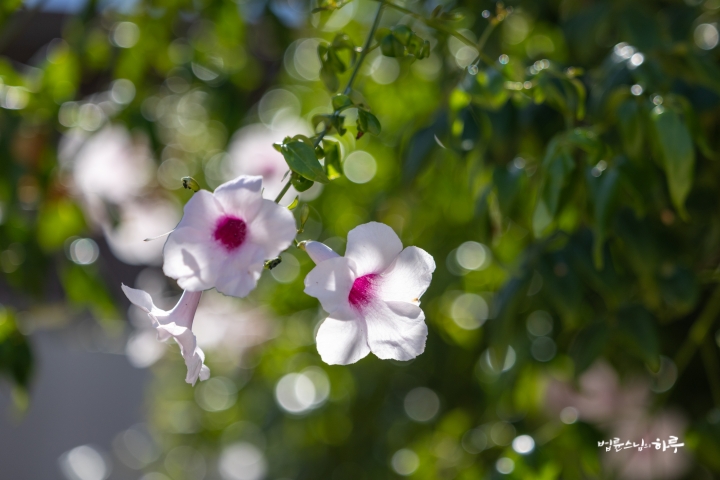
After completing his morning prayer and meditation, Sunim had breakfast and set out at 10 AM to survey potential sites for the LA retreat center.
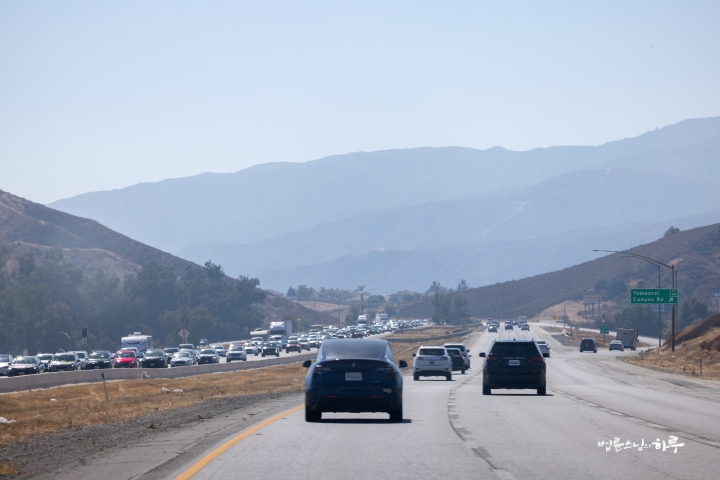
This is the third day of surveying retreat center sites during the stay in LA. On the first day, Sunim went northeast, on the second day northwest, and today he headed south.
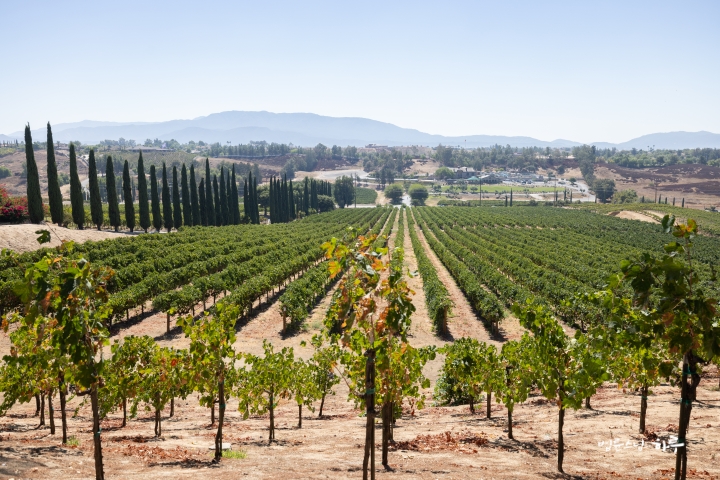
After driving for about an hour south out of the city center, a landscape with many trees and a wide lake unfolded. After examining and surveying several locations, Sunim returned to the lodging at 3 PM.
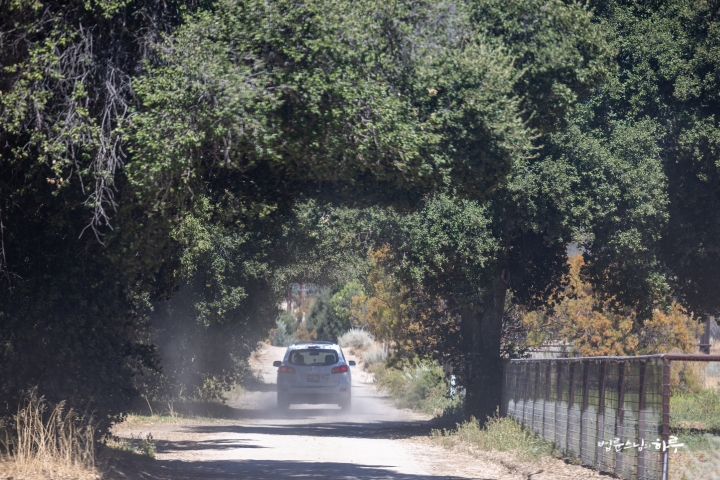
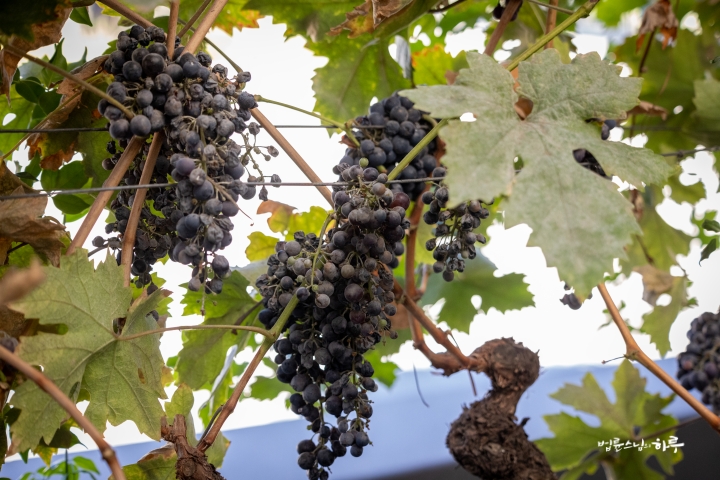
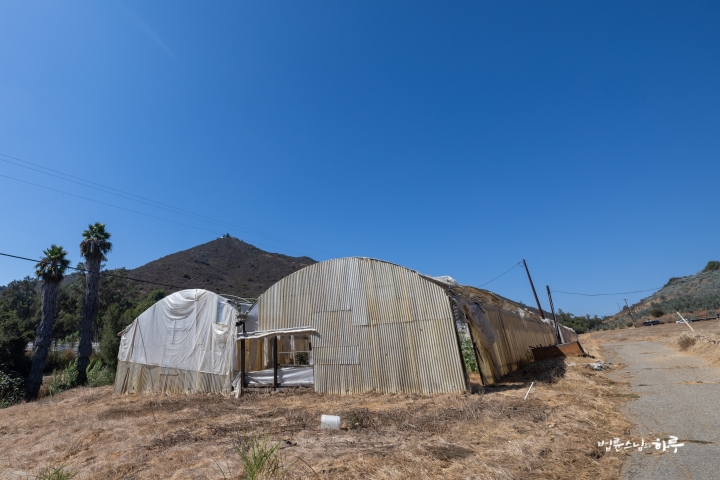
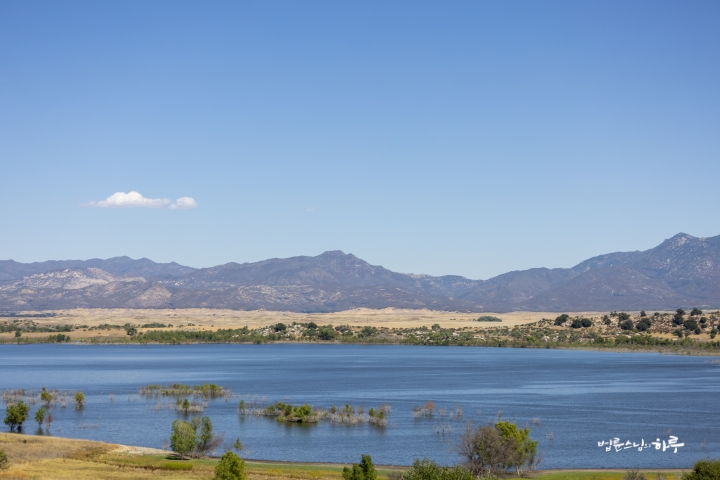
Today is the last day of the North American West Coast lecture tour. After lunch, everyone took a commemorative photo together, including the couples Mr. Lee Kyung-taek and Ms. Kim Kyung-rye, Mr. Lee Seung-hwa and Ms. Go Bon-hwa, and Ms. Bae Yeom, who had been volunteering with lodging, meals, and driving for three days.
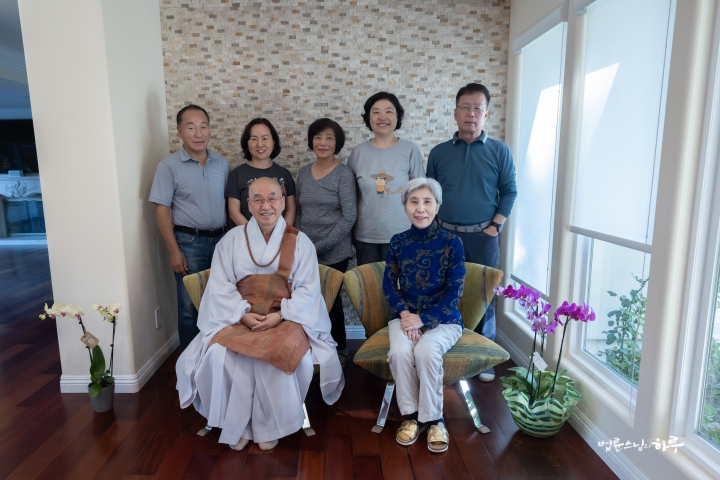
At 4:30 PM, Sunim headed to the lecture venue. Today’s lecture is being held at the DoubleTree by Hilton Buena Park in Buena Park, California. He has been giving lectures at this location every year when visiting Orange County.
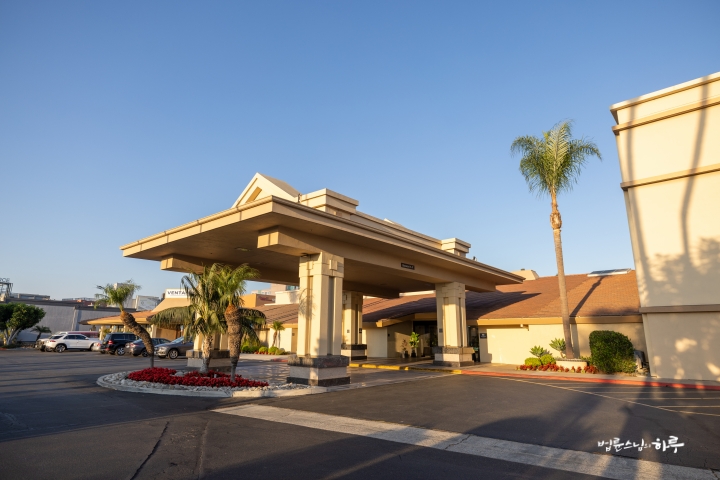
As soon as he arrived at the lecture hall, he first took a commemorative photo with the volunteers who had prepared for the lecture.
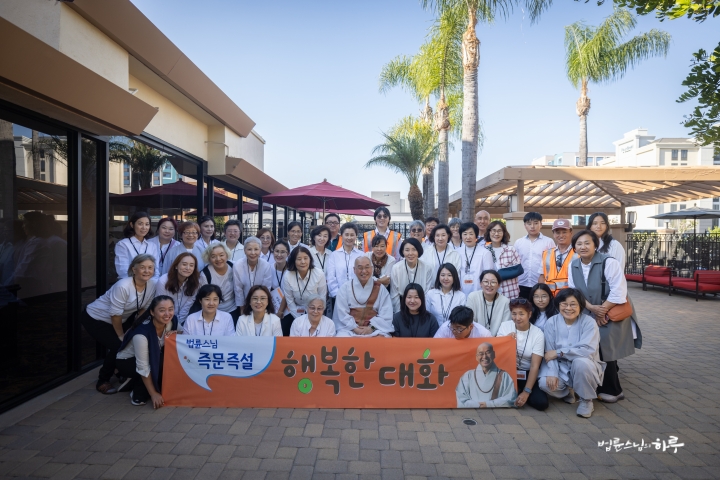
“Orange County! Fighting!”
Since Sunim had to move directly to the airport right after the lecture, he greeted the volunteers first.
“Thank you all for your hard work. I appreciate it.”
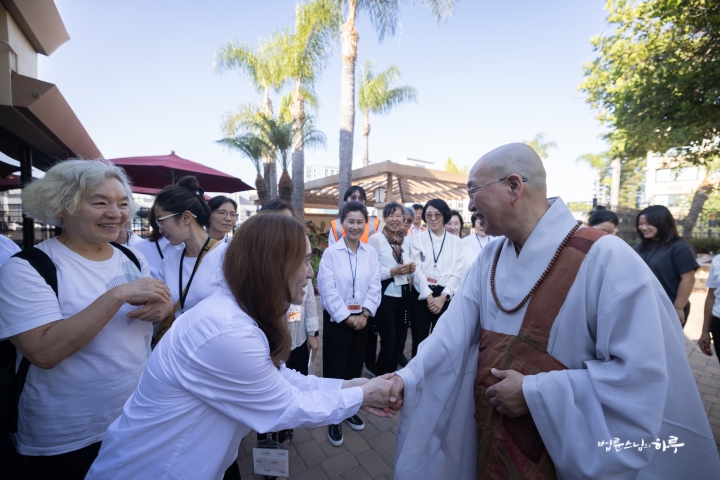
From 5 PM, the Deputy Mayor of Buena Park visited Sunim for a pre-meeting. Deputy Mayor Joyce Ahn is expected to be elected as Mayor by the end of the year, barring any unforeseen circumstances. Sunim greeted her with a smile.
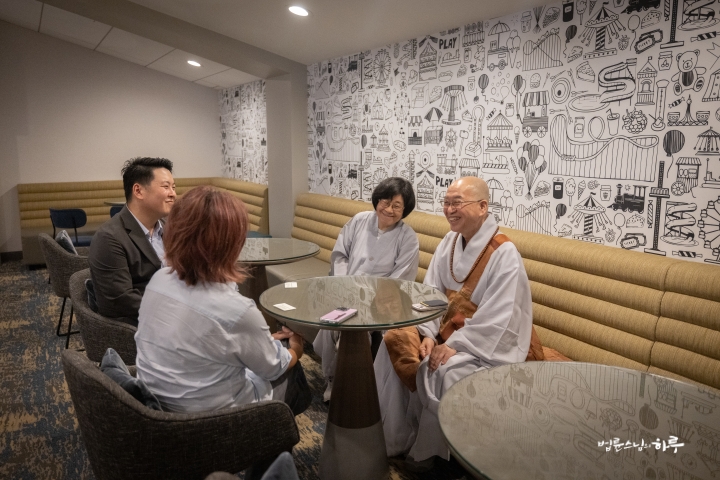
“Nice to meet you. If I had come next year, I could have met the Mayor, but this year I’m meeting the Deputy Mayor.”
The Deputy Mayor asked Sunim a few questions she was curious about and engaged in conversation.
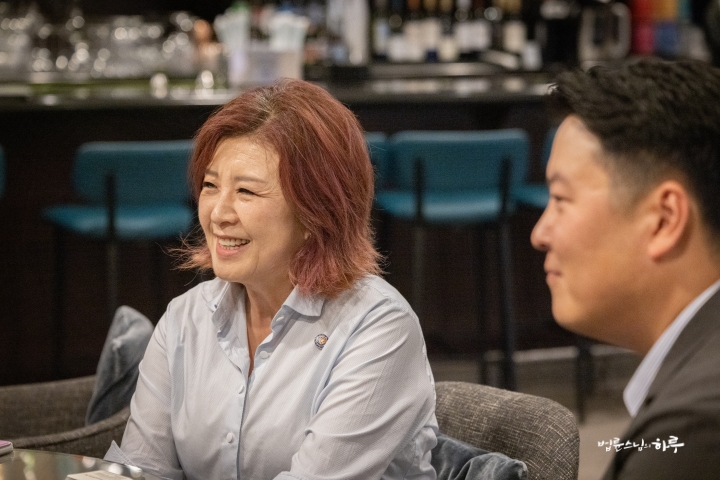
“Please visit us again next year. There are many Korean residents living here in Buena Park. What topics do you usually cover in your lectures?”
“There are no restrictions on topics. It’s not related to religion either. Some people even ask how they can attract more believers to their church. Since I solve problems from the perspective of the person asking, all kinds of questions come up. (Laughs)
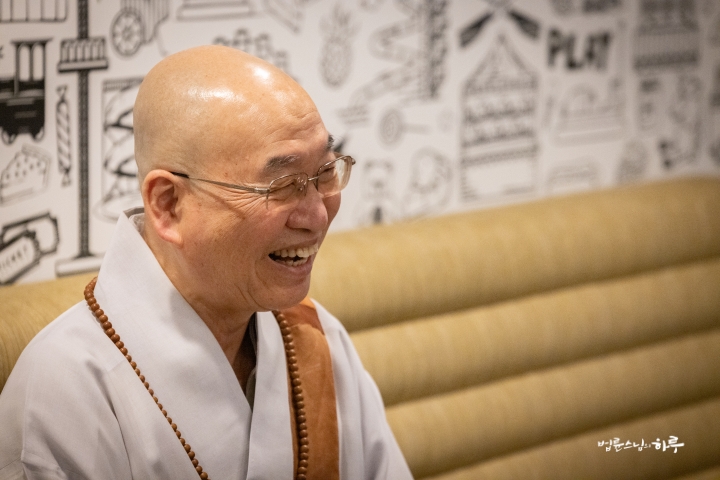
Most questions are about marital conflicts and child-rearing. In foreign countries, there are also many questions about guilt towards parents left behind in their home country, and identity confusion. People talk a lot about the worries they experience in their lives. When there’s social unrest, they also ask questions about war issues, climate crisis, and political conflicts.”
“The next time you come to Orange County, we’ll prepare for you to meet more citizens.”
After 30 minutes of conversation, Sunim presented his book as a gift.
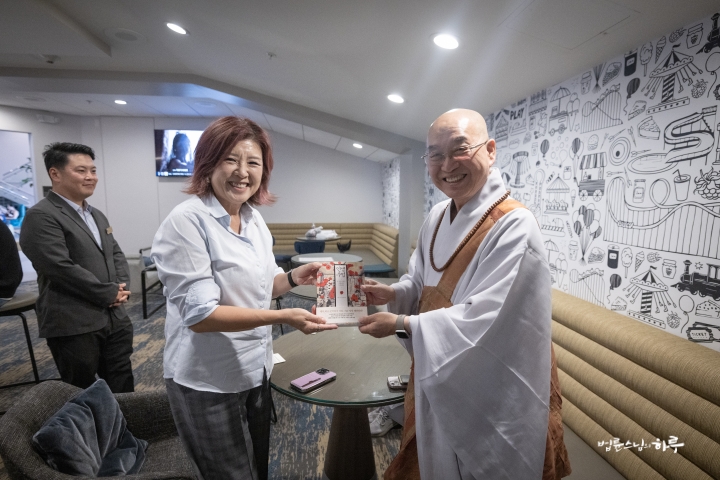
Many Korean expatriates living in LA came to the lecture hall. Volunteers warmly welcomed the expatriates throughout the venue.
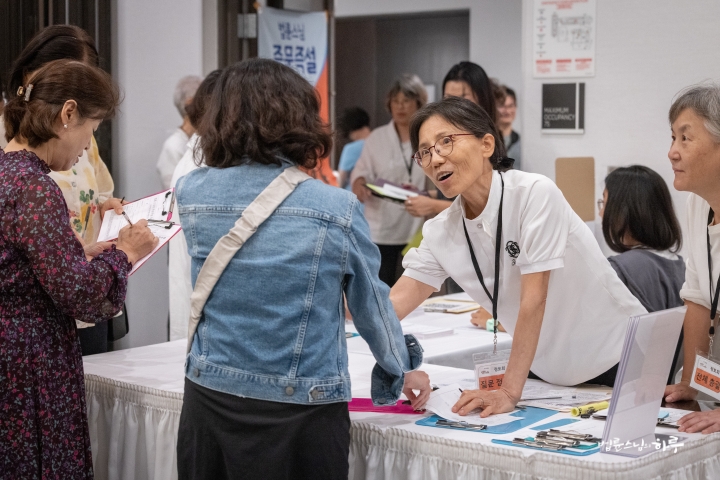
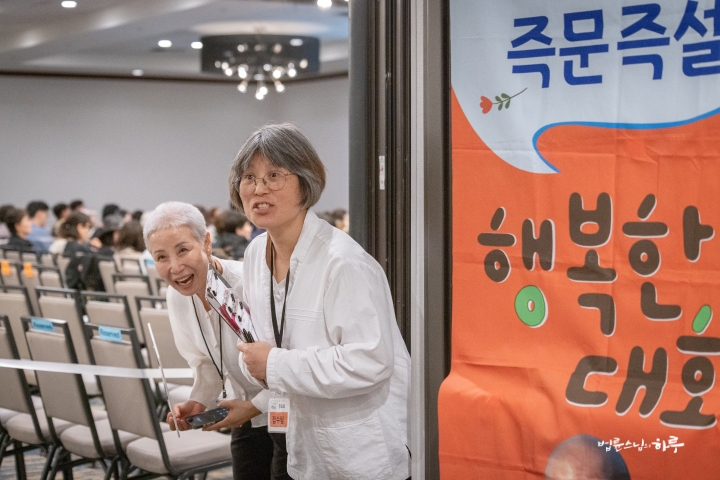
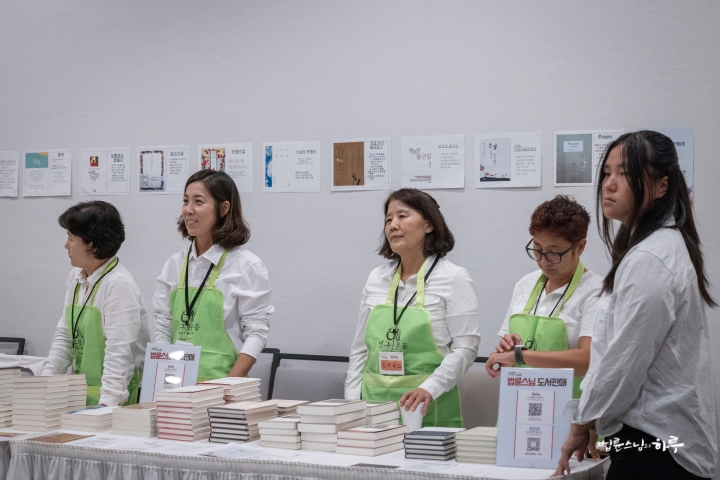
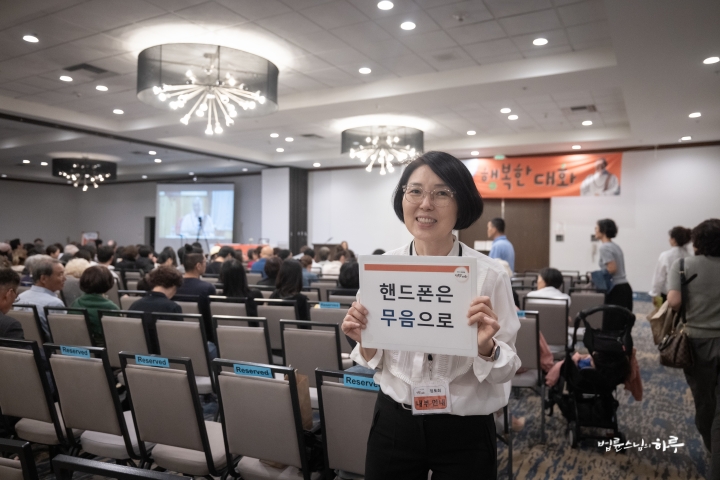
Sunim started a book signing session at 5:30 PM. Many people lined up to get their books signed and greet Sunim.
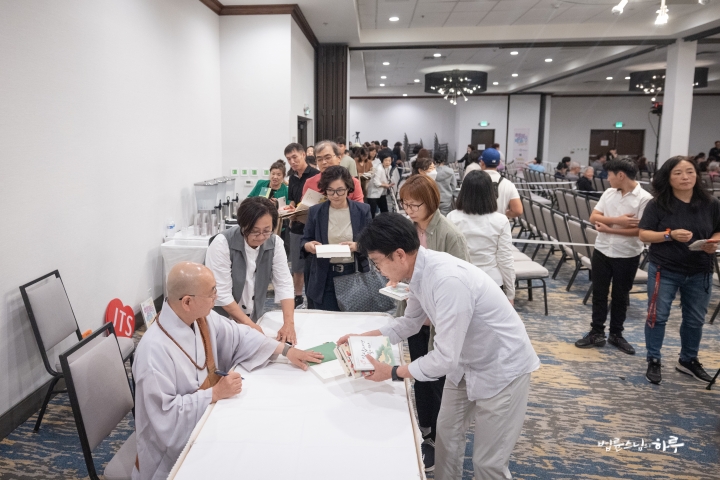
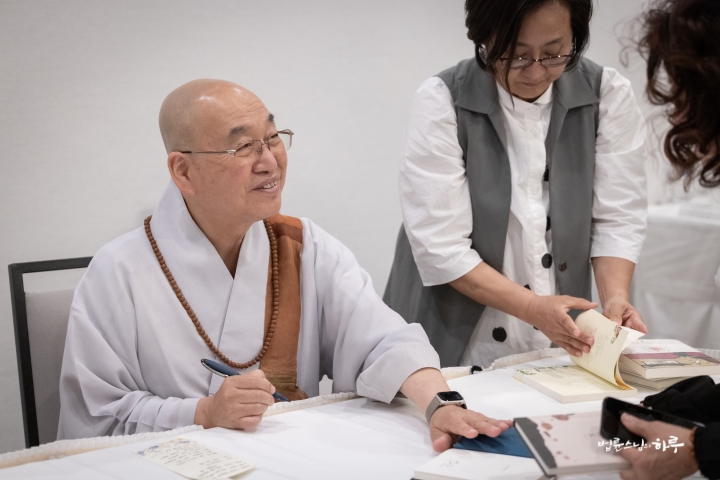
“Sunim, thank you. My life has become so much happier because of you.”
After finishing the book signing, the Dharma Q&A lecture began at 6 PM. After watching a video of Sunim’s recent visit to Bhutan, he walked onto the stage. The audience erupted in cheers and applause.
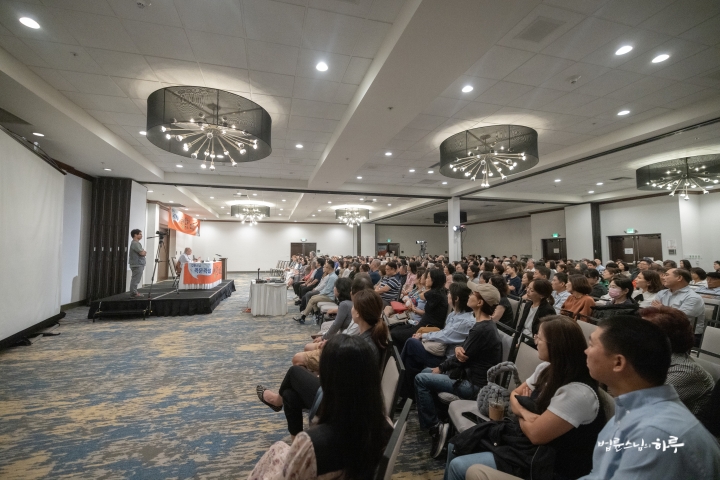
With about 400 people filling the seats, Sunim gave his opening remarks. He briefly introduced his journey over the past month, visiting 10 countries before arriving in Orange County.
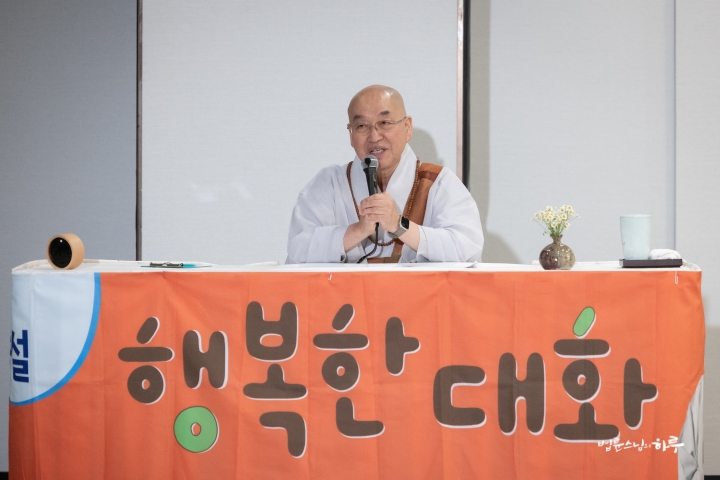
“Today is the day I return to Korea. A month ago, I left Korea and went to Switzerland via Abu Dhabi. Then I visited Germany and Türkiye, and went to the border region of Türkiye and Syria to check on the earthquake recovery efforts. After that, I went to Bhutan to conduct a workshop on sustainable development.
How Should We Live as Climate Change Worsens?
Recently, climate change has been getting more and more serious, with sudden heavy rains and other extreme weather events. Yesterday, Busan and the Jeolla region experienced a once-in-200-years rainfall in Korea. It was announced as the heaviest rainfall in a single day since weather observations began. Also, the recent typhoon showed tremendous power in Japan. Typically, typhoons pass through the Philippines and then move on to China, Korea, or Japan, with one rarely going to Vietnam about once a year. But this recent typhoon went through Vietnam and Thailand, reaching Myanmar and causing enormous damage. Myanmar is usually hit by cyclones originating in the Bay of Bengal in the Indian Ocean, but this time, winds from the Pacific crossed over to the Indian Ocean. Changes in ocean currents and winds due to rising temperatures are now causing massive damage. According to scholars, this is just the beginning of the climate crisis. They predict that if climate change worsens a bit more, there will be tremendous impacts. If these predictions become reality, it will be difficult for humans to continue living as we have been. We can no longer maintain a civilization where we overconsume, eat only half our food and throw the rest away, wear clothes moderately and discard them, keep dozens of pairs of shoes at home, wear jackets with the air conditioning on in summer, and live in just underwear with the heater on in winter. This kind of lifestyle can no longer be sustained.
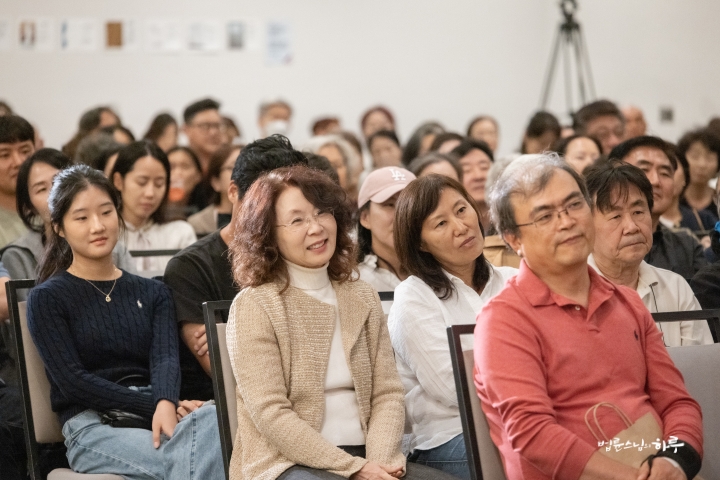
Among the world’s 8 billion people, the 1.2 billion living in developed countries have already caused such a severe climate crisis. Now China and India are also racing down the same path. News reports indicate that India’s economy is growing rapidly and will soon become the world’s third-largest economy. The populations of China and India each exceed that of all OECD member countries combined. This suggests that the current climate change could intensify nearly threefold. In such a scenario, humanity will face two choices: either perish together or revert to primitive consumption levels. Of course, it would be fortunate if the climate crisis doesn’t occur. However, if such a crisis does come, how should we live our lives then?
That’s why I am creating a new model of sustainable development in Bhutan, the least developed region, specifically in Zhemgang, which is said to have the highest poverty rate in Bhutan. I have started a project to realize a model of life in one region that improves basic living conditions but does not develop beyond that. It might seem pointless now, but it’s uncertain whether it will still be considered pointless in 100 years, or if it will be evaluated as a well-prepared foresight for the future. We are currently conducting this experiment in Bhutan.
Then, via Bangkok, Thailand, Sunim conducted Dharma Q&A sessions for Korean expatriates in Australia and New Zealand, and also for locals through interpretation. After that, he went to East Timor. East Timor is currently facing a severe water shortage problem. There, he met with an activist who is planting trees in the mountains or installing devices to collect water in the mountains to develop water sources. They had a conversation about eco-friendly development.
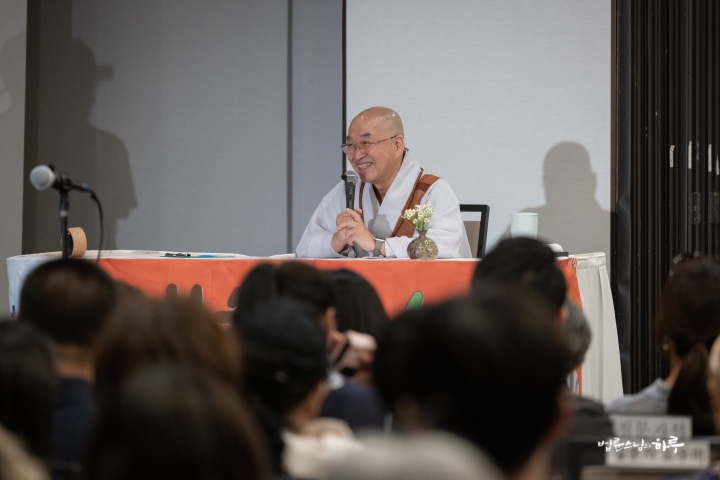
Then, Sunim entered the United States through Seattle. He traveled through Seattle, Vancouver in Canada, San Francisco, Las Vegas, and San Diego, before giving two English-interpreted lectures in Los Angeles. One lecture was in the eastern part of LA, and another in the northern part, concluding yesterday’s schedule. Today, Sunim is conducting a Dharma Q&A for Korean expatriates, which is the only such event for Korean expatriates in this North American tour. After this lecture, Sunim will be returning to Korea on a night flight.
Sunim first engaged in conversations with those who had submitted questions in advance, followed by impromptu questions from the audience. Over the course of two hours, twelve people asked Sunim questions. One of them sought Sunim’s advice on how to overcome the fear of death.
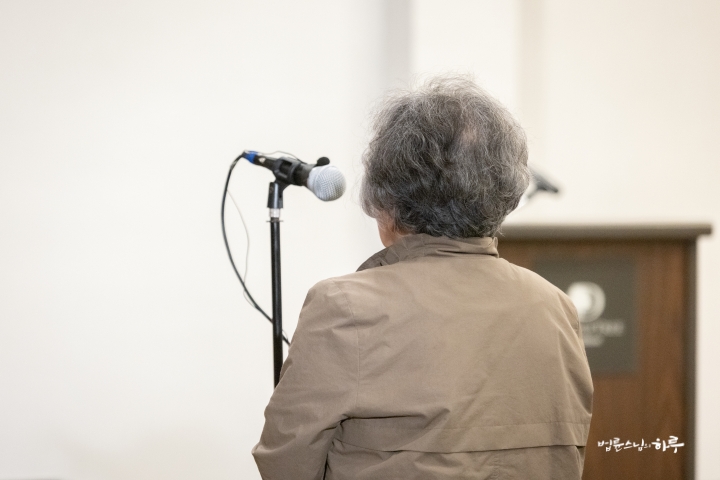
How Can We Overcome the Fear of Death?
“After becoming a monk, I learned through scriptures that ‘practice is about transcending life and death.’ Based on what I read in books, I thought to myself, ‘I don’t have a great fear of death.’ However, in 1979, I was suddenly taken away and subjected to severe torture. At that moment, I became terrified, thinking, ‘Am I going to die?’ They threatened me, saying, ‘If we bury you in a place where no one knows, nobody in the world will know you’re dead!’ They also sat me on an electric torture chair, threatening, ‘If we flip this switch, you’re dead!’ When I was waterboarded or beaten, I had to grit my teeth and endure, so there was no time to feel the fear of death. But even torturers need to rest, so there were break times. When they resumed torture after a short break, I felt tremendous fear. The trauma from the pain I had just experienced made me dread, ‘How will I endure the next round of torture?’ Still, when the torture actually resumed, I would struggle until I passed out, and when they poured water on me to wake me up, I would regain consciousness thinking, ‘Oh, I must have fainted,’ so the fear wasn’t too severe. However, during the break times, when I imagined the next round of torture, fear would arise. Going through this process, I realized, ‘I thought I had transcended life and death, but I hadn’t! I didn’t know myself well!’
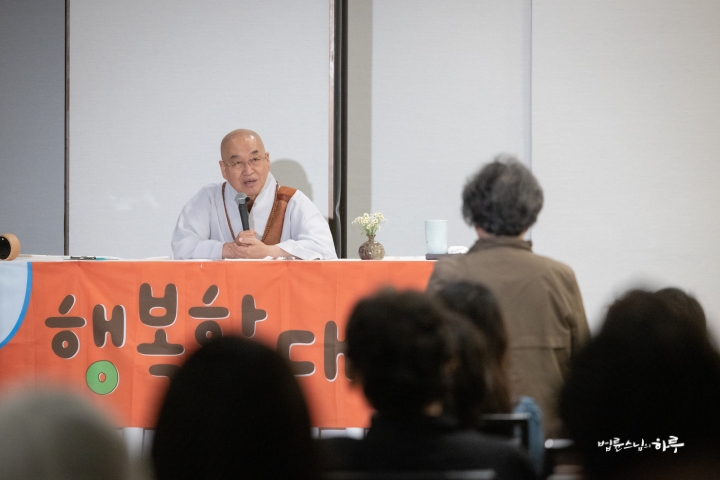
After going through various experiences, my fear of death gradually diminished. Of course, I can’t say that I have no fear at all. Once, I went on a survey to a remote village in India that I was warned not to visit due to its danger. Suddenly, a robber appeared, pointed a gun at me, and demanded, “Give me your money!” At that moment, I felt surprisingly calm. I even found myself smiling. I decided to give him everything I had and emptied my pockets, but since I had left my belongings at the lodging, I didn’t have much money with me. I gave him everything I had, but the robber wasn’t satisfied. From his perspective, he had brought a gun but gained little. At that time, one of my companions had an expensive camera worth several million won, and the robber tried to take it. I thought we shouldn’t let him take the camera. As I observed carefully, I noticed that the robber’s gun was homemade. In that country, homemade guns are common due to frequent gun accidents, so many people carry guns. It was a single-shot gun that needed to be reloaded after each shot. I realized I only needed to prepare for one shot. If it were an automatic gun, I could die, but with one shot, as long as it didn’t hit my heart or head, I thought I would likely survive. Moreover, when someone with a gun is too close, they’re not very threatening. It’s when they point a gun from a distance that it becomes extremely dangerous. However, this robber was pointing the gun at my head from point blank range. Furthermore, I was standing on the stairs, and the robber was below. So, what would be faster? Him shooting or me kicking? That’s how I managed to escape the crisis. When I reflected on myself at that moment, I realized, “I’m not really afraid of death.” It seemed I had improved significantly compared to when I was tortured.
If we think about it rationally, we have no reason to fear death. Of course, fear arises because we have a desire to live. But look at the principles of nature. Don’t all grass grow and die? Don’t all leaves sprout and fall, and don’t all animals are born, live, and then return to the earth when they die? This is a cycle, not death. We only express one link in the cycle as birth and death, but in the natural ecosystem, there is neither life nor death. It’s just a cycle. If you plant a flower in the ground and leave it to nature, the seed sprouts, grows, and blooms. Then again, seeds fall, sprout from the ground, and flowers bloom. If we were to film this process and play it at high speed, what would we see? We would quickly realize that it’s just a cycle. This is neither something to be happy about nor sad about; it’s just natural. However, we are attached to something. That’s why fear arises.
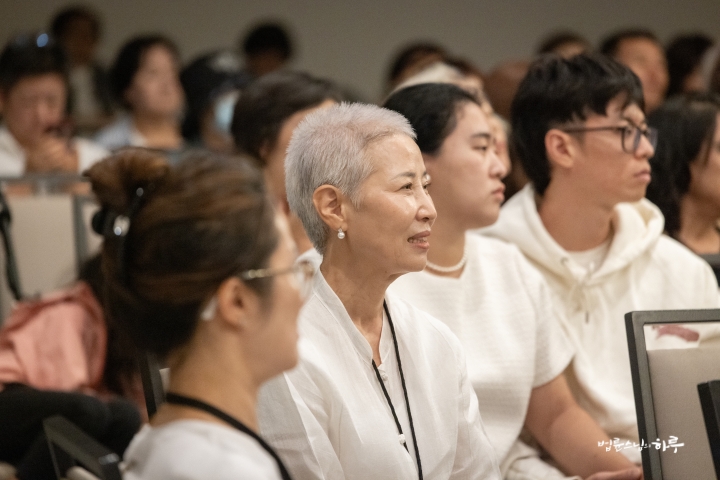
First, we must see things as they are. Second, because we can’t let go of long-held habits, fear arises unconsciously when we actually face situations, like in my story of being tortured. However, as we become more deeply aware, the fear of death becomes much fainter. With even deeper awareness, the fear disappears. That’s why Buddha, after attaining enlightenment, often said, “The Tathagata has no fear” when faced with many death threats. When I first started studying Buddhism, I didn’t understand this well, but as I grew older and gained more experiences, I gradually came to understand it.
Concepts like “going to heaven after death” or “being reborn after death” can be good ways to alleviate the fear of death when it exists. Once you realize there’s no reason to fear death by directly facing it, there’s no longer a need to talk about what happens after death. That’s why Buddha never spoke a word about what happens after death. However, if you fear death, you’ll fear not only your own death but also seeing others die.
How can we alleviate this fear? Death is inevitable, but we fear it, so we think, “We’ll go to a good place after death.” This thought can somewhat reduce the fear because it suggests that the situation will improve after death. It’s reassuring, isn’t it? When parting, we feel sad, but when someone gets promoted and moves elsewhere, relocates to a better country, or leaves home to get married, we feel less sad because they’re all going to better places. That’s why we comfort ourselves by saying, “They’ll go to a good place after death.” The idea that “we go to a good place after death” is the best idea humans have come up with to overcome the fear of death.
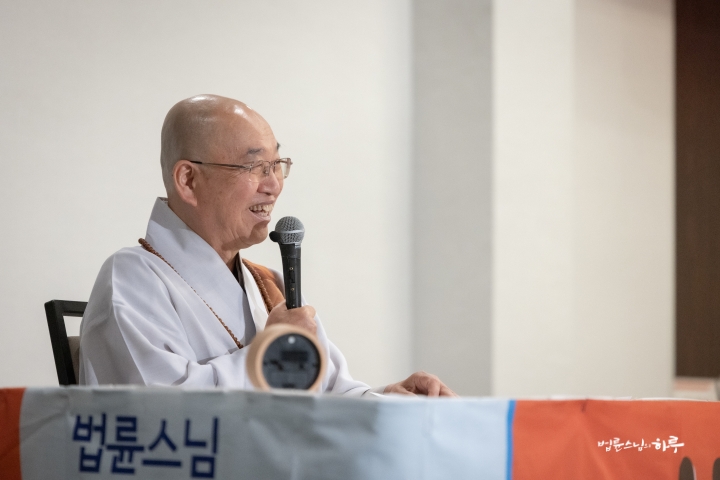
Whether it’s true or not isn’t the important issue. If we say it’s true, it could lead to many side effects, like selling indulgences. If we say it’s not true, many people who haven’t overcome their fear of death would lose a means of comfort. So, saying it’s not true doesn’t help either.
However, Indians came up with an even better idea. If you say people go to a good place after death, no matter how good that place is, you can’t meet them again. But if you say they’re reborn, you can meet them again, which is tremendously better. That’s how the concepts of ‘reincarnation’ or ‘rebirth’ came about. As a result, Indians don’t grieve much over death. They don’t have long funeral ceremonies either. Because they believed in rebirth, they viewed death as a process of taking off old clothes and putting on new ones. To cut off attachment to the old clothes, they needed to eliminate all traces, so they immediately cremated the body. That’s why there’s no culture of putting bodies in coffins in India. When someone dies, they immediately place a few bamboo poles over the body, cover it with cloth, and a few people carry it to the river bank. They dip the body in the river once, believing that this washes away all sins. Then they immediately cremate it.
Of course, for very famous people like the Buddha, they might build a stupa with the remains, but for the majority, they burn the body and let the ashes flow into the river without leaving any trace. They believed that the more traces left behind, the more attachment would arise, hindering rebirth.
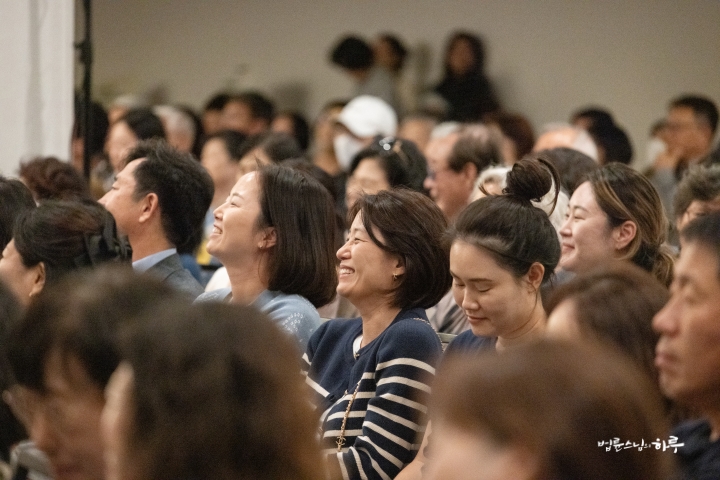
These funeral customs are all related to beliefs. Tibetans believe that one is reborn in the sky, so they cut up the body and place it on rocks in the mountains. They believe that when vultures eat the body and fly high into the sky, the soul quickly ascends to heaven. In countries where people believe the soul leaves through the crown of the head after death, they position the body in a sitting posture whether it’s for cremation or burial. This is because they believe it allows the soul to easily escape upwards.
People living by the sea believe in an ideal world called the Dragon Palace under the sea, so they attach stones to the body and perform sea burial. In the past, among the Wari’ people of the Amazon, when parents passed away, their children would gather around and consume the deceased’s body. They believe, “How can we burn our parents who gave birth to and raised us with fire, or bury them in the ground to rot? We will enshrine our parents in our bodies.” This can be seen as the most filial act, as they think they should live with their parents forever. All of these can be considered funeral methods related to beliefs.
When disciples asked the Buddha about funeral methods, he said, “Let them do as the people of the world do.” In other words, he meant not to worry about it and follow the customs of the world. So when the Buddha passed away, those who conducted his funeral did so according to their customs. That method was cremation. Many people think cremation is a Buddhist practice, but that’s not the case. There is no specific Buddhist funeral method. If the Buddha had been born in Korea, he might have been buried, and if he had been born in Tibet, he might have received a sky burial.
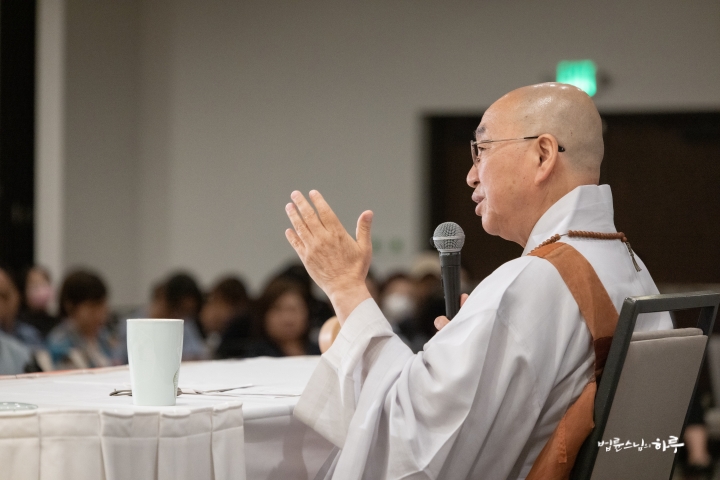
“So for those who fear death, if they are Christian, you can pray for them to go to heaven while singing hymns. If they are Buddhist, you can perform a 49-day memorial service and pray for them to go to the Pure Land. If there’s no fear, you don’t need to do anything. Without attachment, it doesn’t matter if you cremate the body, bury it, or dispose of it in any way. However, since people might criticize you for desecrating the body, it’s better to bury or cremate it so that it’s not visible to others.”
“Yes, I understand. Thank you.”
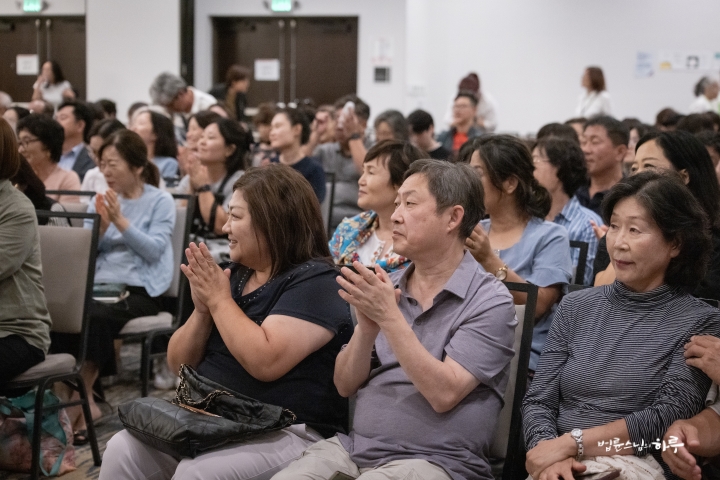
The questions continued.
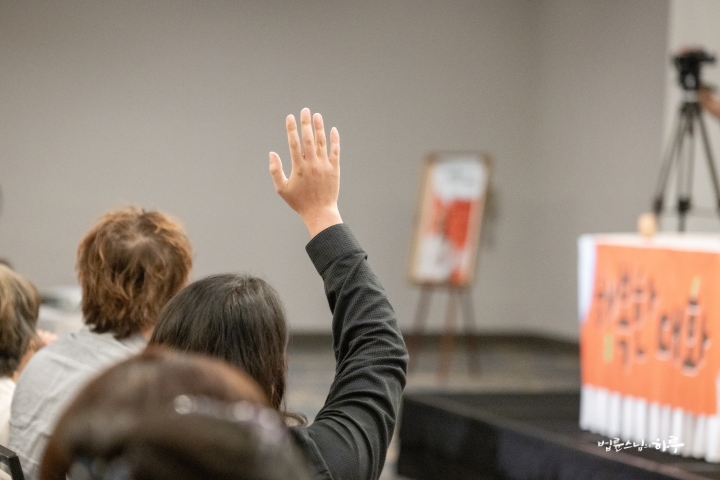
I’m an expectant mother. What mindset should I have in raising my child?
I have a 50-year-old son who was overprotected and a daughter suffering from mental illness. I’ve cut off contact with all my children, and while I feel at peace, I’m not sure if I’m doing the right thing.
After divorcing, I’m finding it difficult to raise my 8-year-old daughter alone and plan to return to Korea by myself. I feel guilty about leaving my child in the US.
My children are being hurt by their scolding father. As a mother, what role should I play?
I feel sad when I’m disrespected because of my age.
I want to eliminate the evil spirits that control the mental world.
I want to return to Korea to care for my parents, but I feel conflicted about leaving my husband and child in the US.
I’m sensitive to others’ opinions and judgments.
After working at a startup in the US, I’m planning to return to Korea to start a business. I’m feeling afraid. How were you able to start Jungto Society?
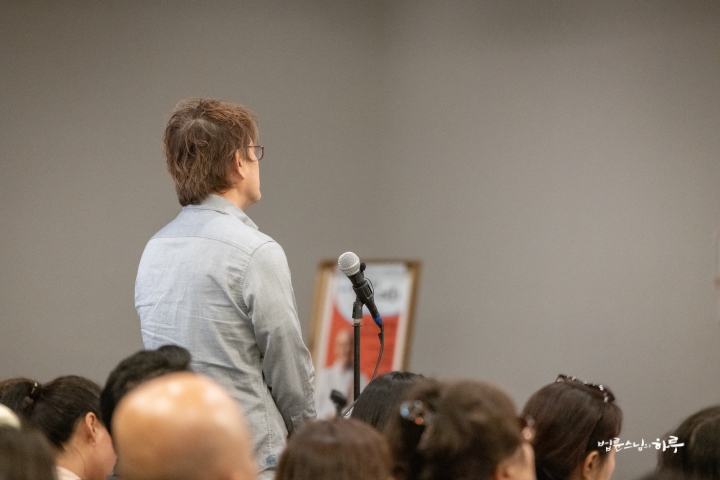
By the time the conversation ended, it was well past 8 PM. While answering the last question, Sunim provided some concluding remarks.
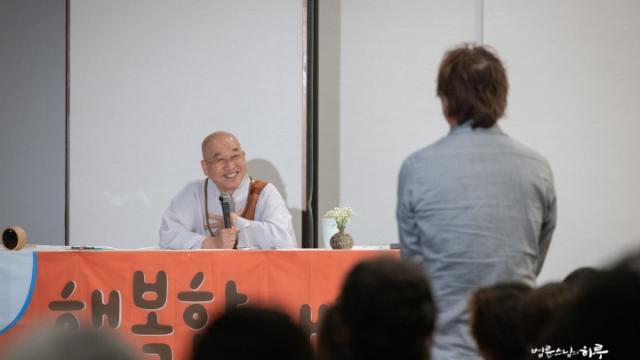
“A few days ago during a Dharma Q&A, someone asked this question. An elderly woman had been married twice and had a boyfriend in between, but they had all passed away, leaving her alone. She asked how she could overcome this suffering. Her first husband died right after marriage, then her boyfriend died, and after remarrying, her second husband also died before her. Most people would think, ‘I have bad luck with men.’ But I don’t see it that way. I told her, ‘You have great luck with men.’ I haven’t even lived with one person, but she has lived with three men. Isn’t that incredibly lucky with men? (Laughter)
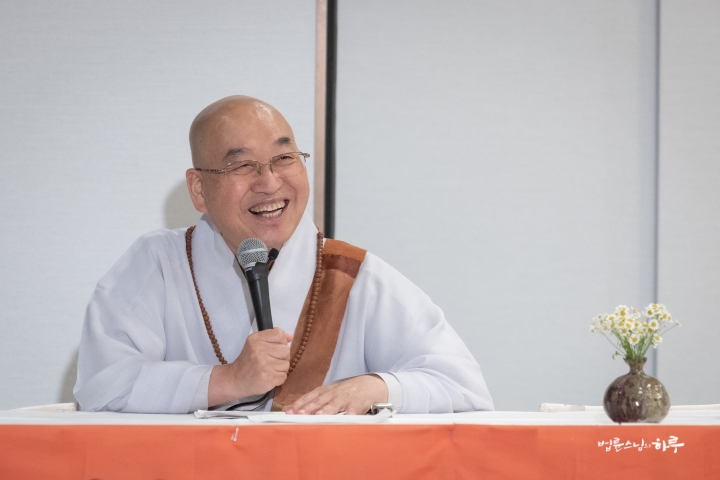
What Kind of Life Makes Me Freer and Happier
There’s no predetermined definition of what constitutes good or bad fortune. If you cling to the standard that ‘you must live with one person for your entire life,’ you become someone with bad luck. But if you let go of that standard, you become someone without any problems. If I had killed or abandoned my husband, that would be my responsibility. But if they died on their own, why should that be my responsibility?
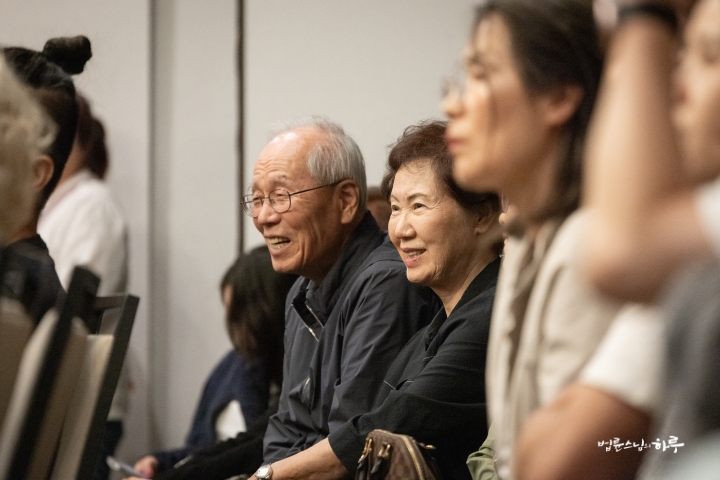
“All our suffering arises from what we choose as our standards. You define your daily experiences as happy or unhappy based on the education, ethics, and morals you learned in school. You meet people and part ways, come and go, succeed or fail in business, pass or fail exams, and each time you evaluate these experiences as ‘happy’ or ‘unhappy’. However, these are just everyday occurrences. There’s no need to complicate things by thinking, ‘What sin did I commit in my past life to deserve this?’ Meeting people and parting ways are natural parts of life. If you let go of your preconceived standards a bit, it’s not a big deal. Without such stress, you can always live life lightly and comfortably. Were these standards created to help us live well or poorly?”
“They were created to help us live well.”
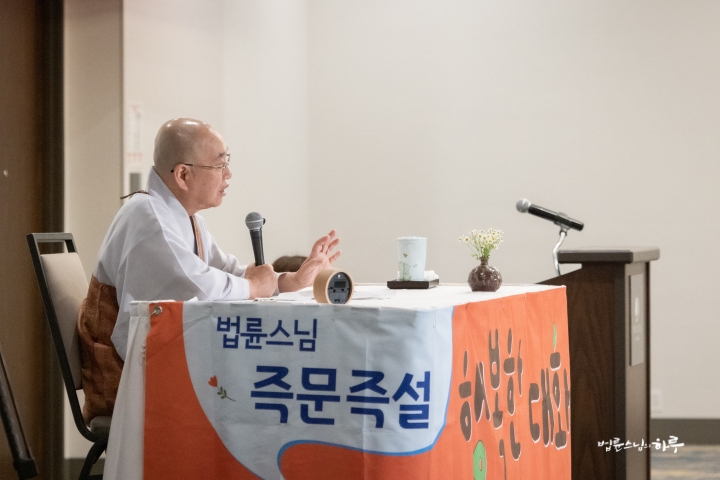
“We artificially create things to live better. However, if these creations are oppressing us, we need to free ourselves from them. I’m not saying we shouldn’t follow ethics or morals. The original purpose of ethics and morals was to make us happier, but if they’re becoming a source of unhappiness, we need to free ourselves from them as well. Whether you divorce or not isn’t important. If you think divorce is better, then divorce. If you think staying together is better, then stay together. The question shouldn’t be ‘Should I live alone or get married?’ but rather ‘Which life will make me freer and happier?’ This should be the standard. I hope you all live happily with this perspective.”
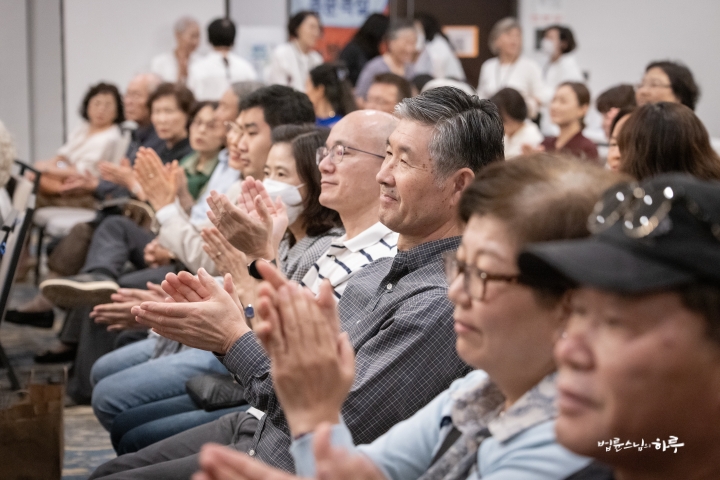
Although some people wanted to ask more questions, the lecture had to end as it was time to leave for the airport.
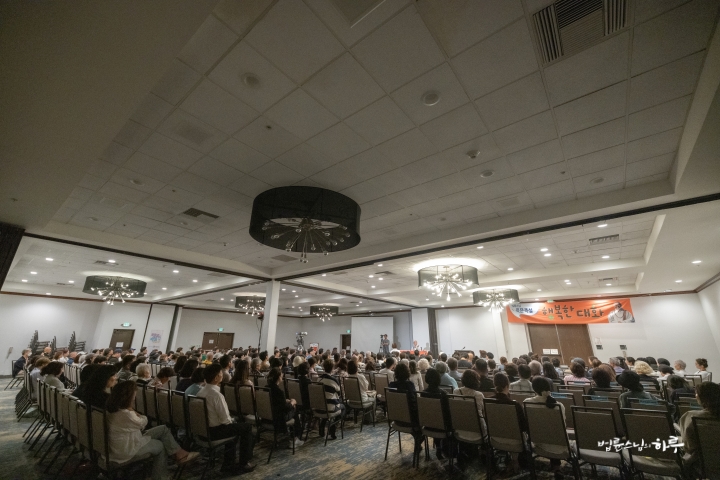
Sunim said goodbye to the volunteers, including the person who oversaw the lecture, and quickly departed from the lecture hall for the airport.
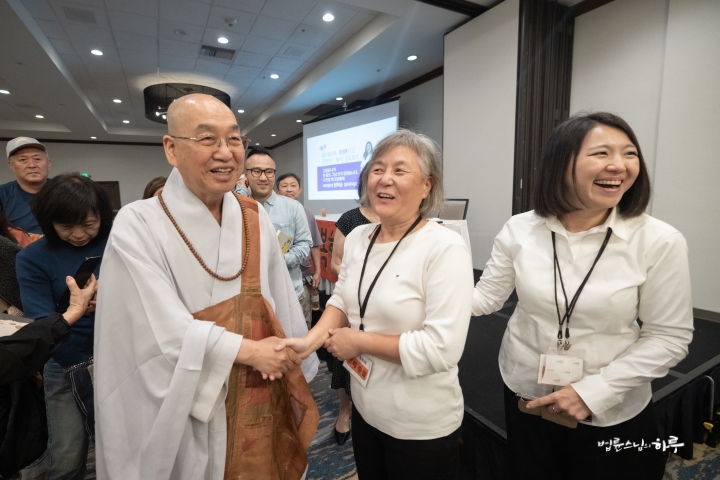
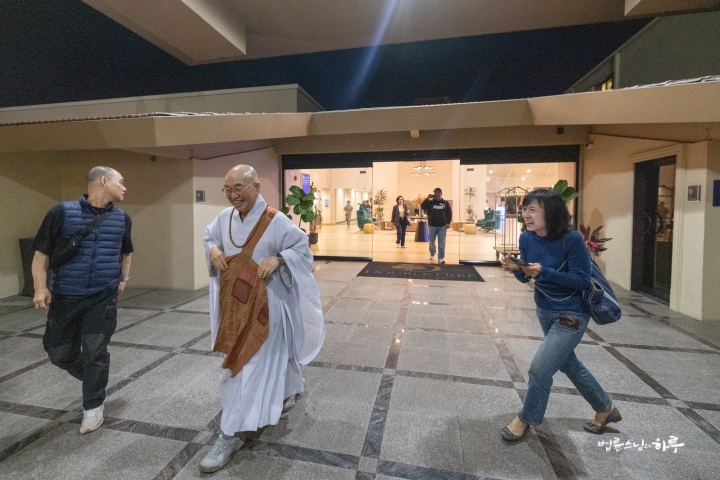
After a 40-minute drive, Sunim arrived at LAX airport at 9 PM.
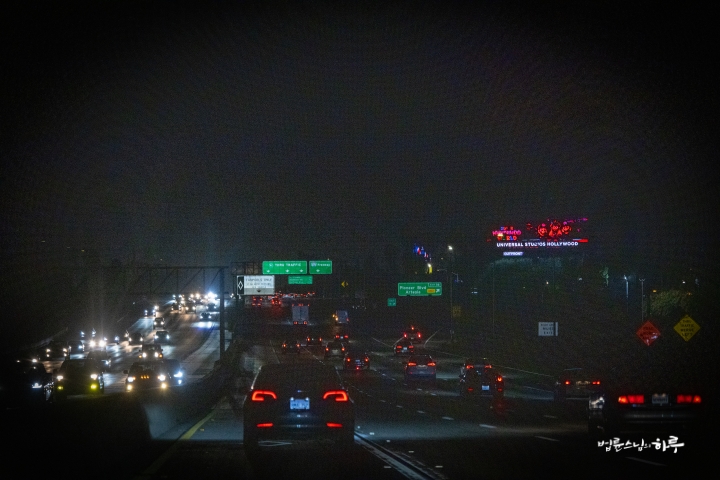
After checking in luggage and completing departure procedures, he headed to the boarding gate.
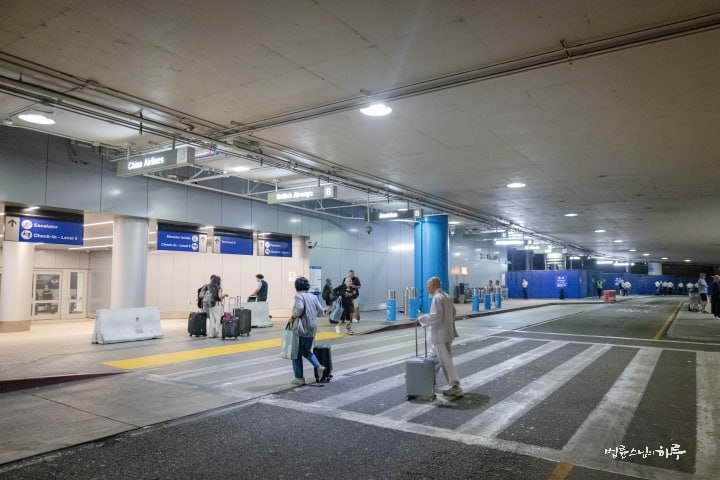
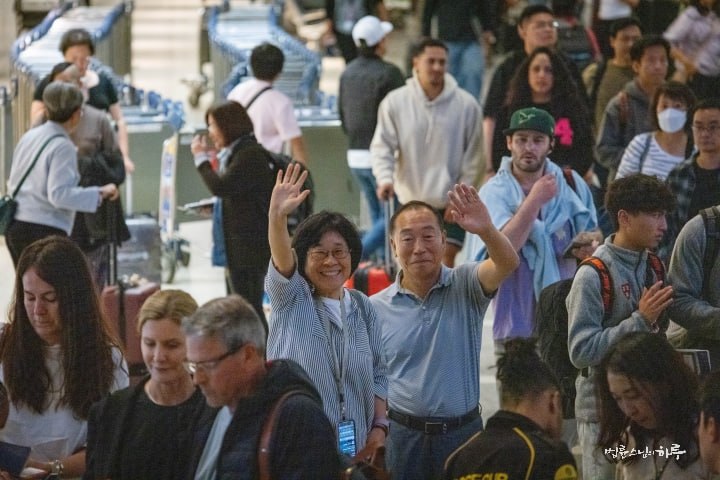
While proofreading manuscripts and attending to work, Sunim boarded the flight to Korea. The plane, departing LAX at 11 PM, is scheduled to arrive at Incheon Airport at 4:20 AM Korean time after a 13-hour and 20-minute flight. Due to the 16-hour time difference between the US and Korea, upon arrival in Korea, a day will be skipped, making it the 24th.
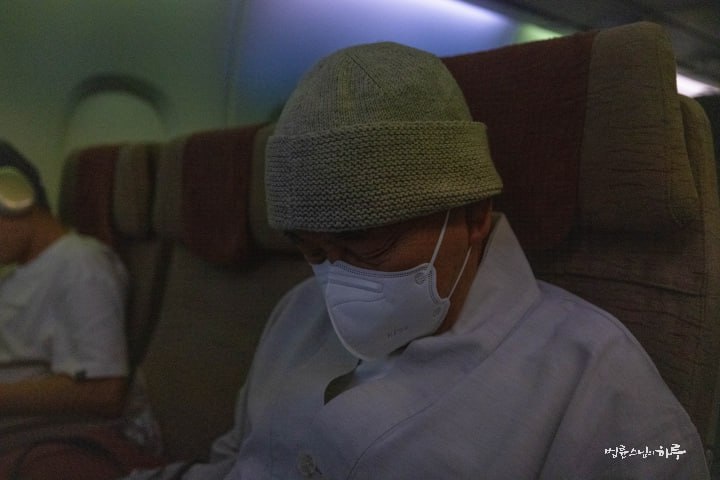
Today marks the successful completion of Sunim’s 33-day overseas schedule. Traveling through 10 countries including Switzerland, Germany, Türkiye, Syria, Bhutan, Australia, New Zealand, East Timor, Canada, and the western United States, he conducted Dharma Q&A sessions, engaged in humanitarian aid activities, and helped those in suffering. While “A Day in the Life of Sunim” couldn’t cover everything, he extend our gratitude to the Jungto Society members and volunteers worldwide who helped ensure the smooth progress of the overseas schedule. Starting tomorrow, “A Day in the Life of Sunim” will continue in Korea.




